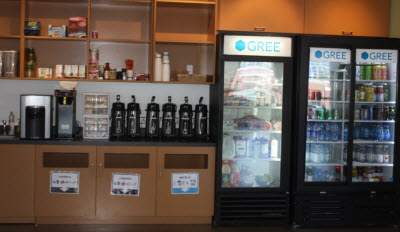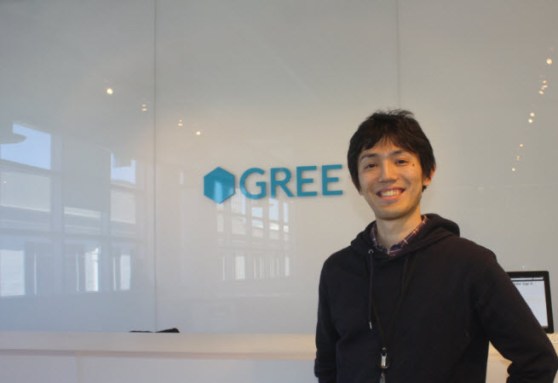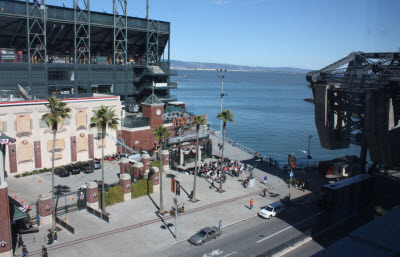The mobile gaming world is getting bigger and bigger. Just take a look at Japan’s Gree, which reported revenues of $1.6 billion and has set up a huge U.S. headquarters just outside of AT&T Park in San Francisco. The company has 450 employees working in the long building, which features a cafeteria on one end and a long set of desks leading to a bunch of glass offices at the far end. They are the foot soldiers in Gree’s expansion into the U.S., where the competition is fierce but the riches are waiting. To find more developers, Gree is investing $10 million in third-party games.
Within the building are hundreds of mobile game developers, headed by Naoki Aoyagi (pictured above), chief executive of Gree International, the overseas subsidiary of the Japanese parent company. Some were part of acquired companies such as Funzio, maker of games like Kingdom Age, Modern War, and Crime City. Those games have been out for months but have been steadily producing revenues in the top grossing charts on the app stores. The hope is to one day have games that generate $100 million a month in revenue.
Last year, the company experimented with new games and heavy advertising. It spent heavily on user acquisition, driving up costs for its rivals. And it acquired, expanded, and then shut down the OpenFeint social mobile gaming platform. While Gree started as a social network for mobile gamers in Japan, it is now driving deep into content.
And it has set up an enticing headquarters — with sofas, arcade machines, and a fancy kitchen — to recruit more developers. The goal is to recruit and retain employees in the fiercely competitive San Francisco gaming market, which is ground zero of the digital gaming revolution. The goal is to come up with a billion-dollar game and stay ahead of rivals such as DeNA, Electronic Arts, Supercell, Rovio, Zynga, and GungHo Entertainment. Gree is moving into all sorts of game genres, including the social casino slot machine business and hardcore titles like the upcoming War of Nations.
Will the company come out on top? It’s Aoyagi’s game to win or lose. We took a tour of Gree’s headquarters recently and interviewed Aoyagi there. Here’s an edited transcript of our interview.
GamesBeat: What are your priorities?
Aoyagi: We’re working on some different games. We have the existing games from Funzio (which Gree acquired for $210 million last year) — we’re upgrading the engine – and we’re also working on new stuff. War of Nations was the game we showed at the Game Developers Conference. It’s our hardcore strategy game. I think that the hardcore gaming users in the tablet market are going to be the hot topic coming up. Everybody’s working on mid-core stuff, as well as the next Clash of Clans (Supercell’s hit game, which is generating $2.4 million a day in revenue), but what we’re doing is different from the others.
GamesBeat: By “hardcore” games, do you mean games that play for a much longer time than mid-core?
Aoyagi: We still want to capture both the mid-core and hardcore. We see a lot of potential in the iPad and the Mini. Hardcore users are going to play more games on tablet. That’s our bet. Still, for the mid-core, we have games from Funzio that are doing pretty well. We can do more with those engines.
GamesBeat: So more hardcore than what Funzio does? More hardcore th an mid-core?
an mid-core?
Aoyagi: Still mid-core to hardcore. We’re also working on some casual games, casino games. Our strength, from acquiring Funzio, was more mid-core, but now we’re trying to expand on both the hardcore side and the casual side.
GamesBeat: How many of your games are created here in San Francisco?
Aoyagi: Our titles for the western market are mostly developed here at this studio. We’re working on some titles at our Vancouver studio that we set up last year, but most of them are in development here. Our portfolio studios are mostly focused on their local markets. The Korean market’s gotten pretty big now. It makes sense to focus on those local markets.
Part of that will be working with partners who fall under our partners fund, like IUGO, the developer of Knights & Dragons. That game’s climbing up the charts. It’s around 40 or 50 right now. That was a publishing deal with IUGO. We did an investment and worked together with them on the title, introducing them to monetization techniques while they developed the game.
GamesBeat: We had our mobile summit last weekend. A lot of people were talking about the Asian mobile messaging services, like Line and Kakao. WeChat may at some point add games. A lot of people have some hope that those will take off in the U.S.
Aoyagi: Yeah. That’s an interesting topic right now. In the past, social networks became a huge market for game developers. Based on what happened in Asia, that might be the next market. But still, in the western market, we don’t see those services taking hold yet. I know Kakao is trying to expand, and so is Line.
The most successful case, in terms of combining a messaging app with games, is Kakao. Line is still focusing on expanding its user base. Kakao did a great job creating a market. Most of the Google Play titles are actually on Kakao’s network. That’s pretty impressive.
GamesBeat: Yeah. The top-grossing worldwide titles are all there.
Aoyagi: Right. Puzzle & Dragons from Gung Ho, games on Kakao’s network, and WeChat, those are the three big things in Asia over the last three or six months.
GamesBeat: Those platforms seem a little heavy on the taxation, though. Half of the revenues go to the platform owner.
Aoyagi: Yeah. 30 percent to the store, and then half of the 70 percent, so the developer only gets so much. But the distribution power of Kakao is pretty strong. It still makes sense for those app developers. It might limit the potential market. In the past, NTT Docomo did a great job. They only charged 10 or 15 percent, and because of that, the market expanded to an incredible size in Japan. If Google or Apple or Kakao were to do something like that – jointly, even – it would be a great thing for the ecosystem.
GamesBeat: If Puzzle & Dragons succeeded all by itself, without the help of those networks, it might change something.
Aoyagi: At the same time, we’ve seen the power of the platforms and the networks in those games. We have some games – mid-core games and casino games – where we’re building in a lot of cross-promotion. That’s been really powerful, even with a smaller number of games. If we can form those alliances, like Kakao is doing, or like ChartBoost is trying to do, that’s powerful. It can generate a lot of traffic for free.
GamesBeat: It might be nice to have the game-focused mobile messaging networks take off in the U.S., but it will take a while.
Aoyagi: Right. Or it might never happen. This market is more competitive than the others. Europeans and Americans never got into the Asian market. Only those local Asian companies had a chance to grab market share. They’re good at that combination of social networking and games in general from back 10 years and more, like Gree, DeNA, and Tencent.
GamesBeat: I didn’t hear any games stuff in the Facebook Home announcement. Did you pay much attention to that?
Aoyagi: No, I didn’t, but I should have.



